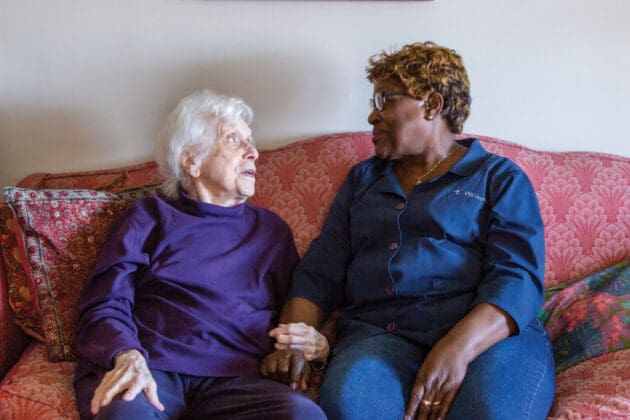
Yet again New Yorkers are in the midst of another hot summer, with temperatures over 90 degrees—a trend that has unfortunately become all too common. Experts predict that by the year 2080, the number of heat waves will increase up to 400%. While rising temperatures pose a danger to all New Yorkers, individuals with Alzheimer’s and other forms of dementia are especially at risk.
As a Clinical Director at the non-profit home- and community-based health care organization VNS Health, I work with clinicians who, day in and day out, see clients in their homes, in heat waves as well as in snowstorms. Heat waves can be particularly dangerous for people with dementia because they often lack the ability to perceive internal temperature changes, which can lead to dehydration and/or heat stroke. Dementia can also damage or disrupt the functioning of internal systems that regulate body temperature so the body can’t accurately adjust for increased heat.
For caregivers looking after loved ones with dementia, or for people who simply want to make sure their neighbors are safe, here are a few hot-weather tips from VNS Health home health aide Petra Peter-Charles, who has been caring for people in their homes—including individuals with dementia—for over 20 years.
Keep Hydrated
- One of the biggest threats during a heat wave is dehydration. According to the National Institutes of Health (NIH), Alzheimer’s can disrupt the brain’s typical neural pathways, leading to a loss of brain function. As the body becomes dehydrated, less blood flows to the brain, which increases the sense of confusion that dementia patients often experience. Keep water handy. ”Always keep a glass of water close,” says Petra. “I continually remind those I care for that they need to keep hydrated, sometimes just by putting a glass of water in front of them early in the day.” Petra also notes that using the right glass matters. Ideally it should be lightweight and preferably clear so a loved one can see what’s inside, or brightly colored to draw their attention.
- Prevention is the best cure. “By the time someone realizes they’re thirsty,” says Petra, “their body is already dehydrated, so it’s important to think ahead.” She recommends that you encourage your loved one to drink a sip of water every hour, even if they say they are not thirsty.
- Lead by example! Petra notes that sometimes sitting next to a loved one and either drinking or mimicking drinking can encourage them to follow your lead and stay hydrated.
Safety Inside the Home
Another danger for people with dementia is heat exhaustion. While most people can adapt to warm weather by staying hydrated, or by turning on the air conditioning, or simply by staying inside, people with dementia often lack the autonomy to take these basic steps.
- Turn on the A/C. It may seem obvious, but it’s worth remembering that having the A/C or fans on the highest setting before the home gets too hot is one of the best ways to maintain a cool and even temperature throughout the household.
- Limit sunlight. Rooms can heat up quickly from window sunlight, so keep curtains closed to maintain a lower temperature inside.
- Cool washcloths. Petra says she has found one of the best ways to keep cool even without A/C is to place a wet and cool washcloth on the back of a neck. “It’s a good way to bring someone’s temperature down safely and quickly,” she says.
- Stay inside. Although most of her patients enjoy staying inside, Petra says she has some dementia clients who love to go on walks. In these cases, it is helpful to go to public places with A/C such as libraries, museums, or even big grocery stores. New York City also has a list of free, accessible cooling centers.
Maintain a “Cool Head!”
All of us tend to become a little more short-tempered when it gets hot. This is true as well for people with dementia. They may become more irritable when it’s hot because of physical distress caused by the heat. As Petra describes it, “It’s like a loop or a switch that flips on in the head,” which immediately changes the person’s entire demeanor. After this switch is “flipped,” a patient might be less likely to listen to advice, which is frustrating for a caregiver.
Make sure you are taking care of yourself, too! Sometimes seeking respite care, even short-term, can help you feel more rested, recharged, and capable of caring for a loved one with dementia.
As increased temperatures become our new normal, it’s important to be mindful of the challenges faced by individuals with dementia and other chronic health conditions. While caring for someone with dementia can be challenging, following these tried and tested tips can help alleviate some of the stress and help both you and your loved one!
Marzena Proszowska-Lambert, MSN, BSN, RN, is the Personal Care Clinical Director at the home and community nonprofit VNS Health.
Learn more about VNS Health’s Dementia Care at Home Program here.


